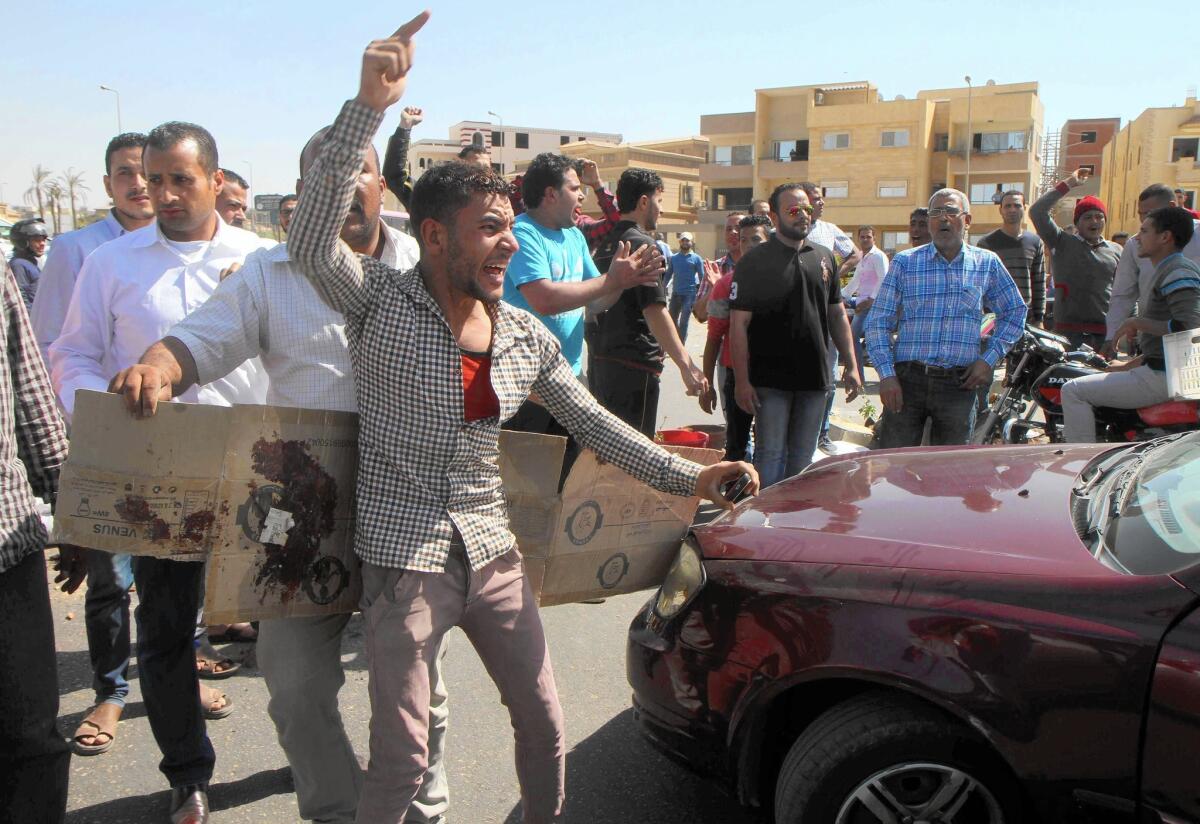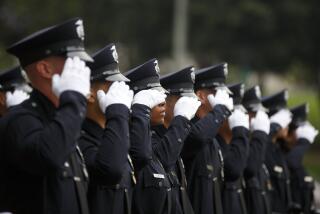A police officer killed a man over a cup of tea in Egypt

- Share via
reporting from CAIRO — The latest incident highlighting complaints of police abuse in Egypt started with a cup of tea.
According to witnesses interviewed by authorities, a police officer had grown accustomed to getting a cup of tea from a street vendor for free.
On Tuesday, when the vendor finally asked the low-ranking officer to pay, the officer pulled out his gun and killed the vendor in broad daylight in the New Cairo district, authorities said.
The angry officer fired three bullets from his gun, also injuring two other people, according to initial prosecution investigations. Angry motorists crashed into his police vehicle to prevent him from fleeing and he was later arrested.
See more of our top stories on Facebook >>
Video of scores of people protesting the shooting later spread across social media accounts.
Scores of similar altercations involving police have been reported over the last few months, with officers accused of harassing, raping, blackmailing and killing citizens.
Although the Interior Ministry acknowledged a number of cases of police abuse reported by local and international media, top police officials have often dubbed the assaults “individual cases,” adding, as if by explanation, that lower-ranked officers do not go through the same training and educational programs their superiors undertake.
In reaction to Tuesday’s killing, Interior Minister Magdy Abdel Ghaffar insisted that the actions of one policeman do not reflect the “efforts and sacrifices” made by the majority of officers to maintain peace and security.
“Any officer who commits a mistake is immediately subjected to investigations,” Abdel Ghaffar said.
This month, another police officer was sentenced to life in prison after he was found guilty of killing a citizen in Cairo in February.
According to the court ruling, Officer Mostafa Mahmoud Abdel Haseeb refused to pay a driver the agreed-upon fee for moving his furniture. Abdel Haseeb took out his gun and shot the driver by mistake as the argument heated up.
The incident prompted hundreds of angry citizens to gather outside Cairo’s Security Directorate for hours to protest the killing.
Other victims of police assaults were less successful in getting justice.
The actions of another officer led to a nationwide strike and a protest by thousands of members of the Egyptian Medical Syndicate, a doctors union, in February after he beat two physicians at a public hospital for refusing to treat him ahead of other patients.
Khaled Fahmy, a professor at the American University of Cairo who had written about Egyptian police history, said the Interior Ministry generally tolerates excessive force against civilians.
“For years, we have been saying that the culture endorsed by officers is: Do what whatever you want and we [the ministry] will protect you,” Fahmy wrote on his Facebook page, referring to the deaths on Tuesday and in February. “This does not mean that there aren’t any honorable officers, but the dominating culture within the ministry is stronger than those honorable officers.
“It cannot be a coincidence that two low-ranked officers have killed innocent people just because the assaulted were asking to be paid for the services they provide officers with.”
The latest killing comes as the Egyptian security apparatus is facing increased criticism after the torture and death of an Italian doctoral student, Giulio Regeni, in January.
Authorities say Regeni was attacked by men impersonating officers, and deny any role in his death.
Critics and the Italian government say Egyptian authorities have hindered investigative efforts and withheld information about the killing. Italy withdrew its ambassador from Egypt for consultations over the matter.
Hassan is a special correspondent.
ALSO
Up to 500 feared dead in wreck of migrant smuggling boat in Mediterranean
Obama goes to Saudi Arabia to rebuild a relationship strained by Iran, Islamic State and 9/11
Fidel Castro, nearing 90, calls on Cuba’s Communist Party to carry on revolutionary ideals
More to Read
Sign up for Essential California
The most important California stories and recommendations in your inbox every morning.
You may occasionally receive promotional content from the Los Angeles Times.










